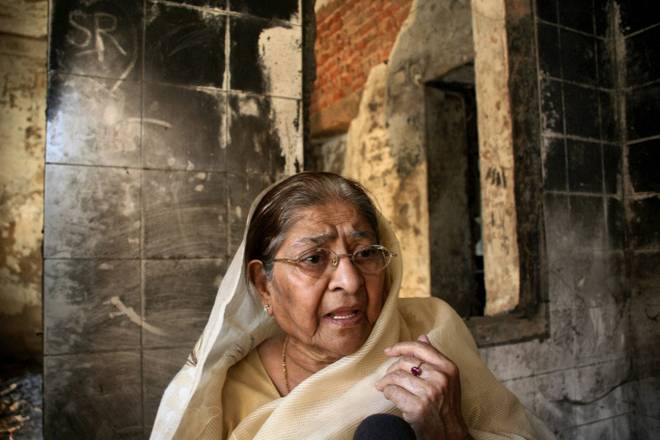Zakia Jafri’s Plea Against PM Narendra Modi In 2002 Riots Case Rejected:
 AHMEDABAD : The Gujarat high court on Thursday rejected a petition filed by Zakia Jafri that challenged a clean chit given by Supreme Court-appointed Special Investigation Team (SIT) to then chief minister of Gujarat Narendra Modi and other top politicians and bureaucrats. The High Court, however, allowed Ms. Jafri to approach higher fora for further investigation in the case.
AHMEDABAD : The Gujarat high court on Thursday rejected a petition filed by Zakia Jafri that challenged a clean chit given by Supreme Court-appointed Special Investigation Team (SIT) to then chief minister of Gujarat Narendra Modi and other top politicians and bureaucrats. The High Court, however, allowed Ms. Jafri to approach higher fora for further investigation in the case.
Zakia Jafri, 79, had approached the high court in March 2014 against a lower court verdict accepting the SIT’s report, which concluded that then Chief Minister Modi took all possible steps to control the riots that swept through Gujarat after coaches of the Sabarmati Express train were set afire at Godhra station in the state, killing 59 people.
The SIT’s closure report, filed on February 8, 2012, gave a clean chit to Mr. Modi and others. In December 2013, the metropolitan magistrate’s court in Ahmedabad rejected Ms. Jafri’s petition against the report, after which she moved the High Court in 2014.
Jafri, whose husband, a former Congress MP Ehsan Jafri, was among 69 people who got killed in the Gulbarg massacre in 2002, had alleged that there was a larger conspiracy in the riots that took place in the state then. On 27 February 2002, a train coach was set on fire at Godhra in Gujarat, killing 57 Hindu pilgrims who were returning from Ayodhya. The train fire triggered one of the country’s worst communal riots in the home state of Prime Minister Narendra Modi, who was then chief minister of Gujarat.
The court while rejecting Jafri’s allegation of a larger conspiracy, however, allowed her to challenge the lower court’s decision that said it had no power to direct the SIT to further probe the matter. Jafri and activist Teesta Setalvad’s NGO Citizen for Justice and Peace blamed Modi and 57 others for their inaction to contain post-Godhra riots. Jafri had earlier approached the Supreme Court which told SIT, led by former CBI chief R.K. Raghvan, to re-investigate riot-related cases in Gujarat, including Gulbarg massacre case.
The Supreme Court had in September 2011 referred the matter to a local court in Ahmedabad. The SIT, in its closure report in February 2012, had given a clean chit to Modi and others. In December next year, the metropolitan magistrate’s court in Ahmedabad rejected Jafri’s petition challenging the SIT report.
Meanwhile a special court in June 2016 found 24 people guilty in connection with the 2002 Gulbarg Society massacre case. While 11 were convicted for murder, 13 were found guilty of lesser offences, including rioting, but not murder. The court also acquitted 36 people, including a Bharatiya Janata Party (BJP) councillor and a police inspector while holding that the Gulbarg massacre “was not a pre-planned conspiracy”.
Ms. Jafri’s lawyer, Mihir Desai, argued in the High Court that the magistrate, while accepting the SIT’s closure report, did not even consider other options such as rejecting the report or ordering a fresh probe. The lower court ignored the Supreme Court’s guidelines and did not consider signed statements of witnesses, which suggested that there was a conspiracy.
The magistrate also ignored submissions of key witnesses such as (former IPS officers) Sanjiv Bhatt, R.B. Sreekumar and Rahul Sharma, and ignored the findings of Tehelka magazine’s sting operation, Mr. Desai said. The riots could have been prevented, and certain ministers, police officers and bureaucrats abetted the violence, he alleged.9With Agency Inputs ).

